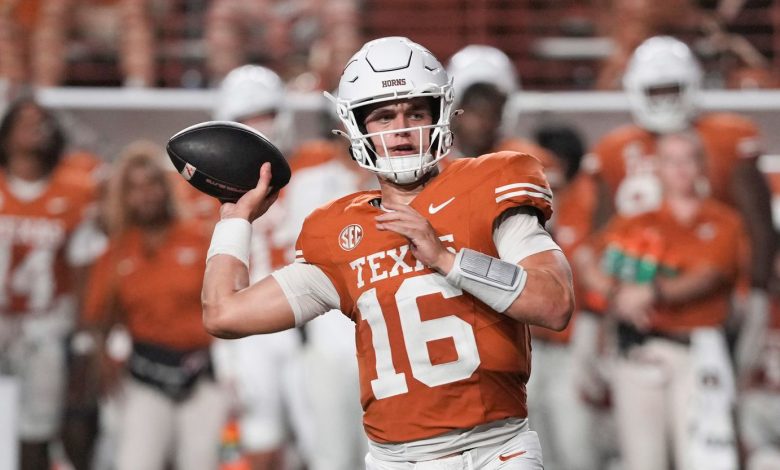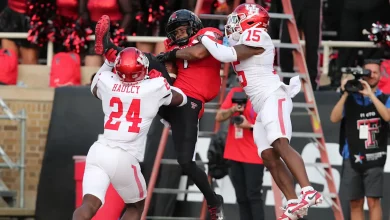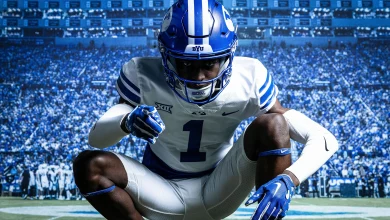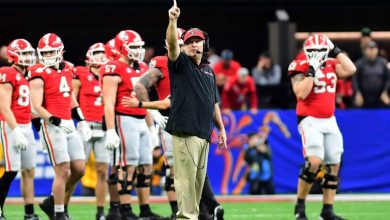NCAAF News: Arch Manning discusses the main factors that led him to select the Texas Longhorns

In the world of college football, few recruitments have generated as much buzz and excitement as the one surrounding Arch Manning, the top quarterback prospect of the 2023 class. As the heir to one of football’s most famous families—his uncles, Peyton Manning and Eli Manning, are two of the most accomplished quarterbacks in NFL history—Manning’s recruitment was closely watched by fans, analysts, and college programs alike. Arch Manning’s decision to commit to the Texas Longhorns in June 2022 was a monumental moment, not only for the Texas football program but also for the future of college football recruiting.
With his commitment, Arch Manning helped elevate the Texas Longhorns’ recruiting class to new heights, signaling the beginning of a potential transformation for the storied program. As one of the top-rated quarterbacks in high school football, his choice of school was never just about the individual but about what the commitment meant for the broader landscape of college football. In interviews and discussions since his decision, Manning has outlined the primary factors that influenced his choice to wear the burnt orange of the Texas Longhorns.
In this article, we will delve into the main factors that led Arch Manning to select Texas, explore the significance of his commitment to the Longhorns, and analyze how his decision could shape the future of the program. We will also examine the broader context of Manning’s recruitment and how it fits into the larger narrative of college football’s changing landscape.
The Manning Legacy: A Family Legacy to Live Up To
Arch Manning’s family legacy is an undeniable factor in his recruitment. Being the grandson of legendary quarterback Archie Manning, and the nephew of Peyton and Eli, Arch Manning has grown up with football in his blood. The expectations placed on him from a young age were immense, not only because of his family’s NFL success but because of the level of scrutiny his recruiting process would face. As one of the most high-profile quarterbacks in high school football history, Manning’s every move was analyzed, and his commitment would undoubtedly have far-reaching implications.
From the moment he began to play high school football at Isidore Newman School in New Orleans, Louisiana, Arch showed signs of greatness. His pedigree was clear—his uncles Peyton and Eli were both NFL stars, and his grandfather Archie had a long and successful career with the New Orleans Saints. However, Arch Manning was determined to carve out his own identity and legacy in the world of college football.
While the Manning legacy was certainly a factor in his recruitment, it did not dictate his decision. Arch was clear in his intention to make his own mark on the game and to choose the school that was the best fit for him, both academically and athletically. He emphasized that his decision would not be based solely on his family’s history but rather on his individual goals and vision for his future.
The decision to attend Texas was not about fulfilling a legacy but about the opportunity to continue his development in a program that was rising to prominence. Texas, with its rich football history and strong tradition, presented an ideal platform for Arch to prove himself and establish his own legacy, separate from the shadows of his uncles.
The Longhorns’ Vision for the Future
When Arch Manning announced his commitment to the Texas Longhorns, it was clear that he was not just choosing a school based on its past successes. While Texas has a long and storied history in college football, including four national championships and numerous legendary players, it has also experienced a period of rebuilding in recent years. However, under head coach Steve Sarkisian, Texas was in the midst of re-establishing itself as a powerhouse, and Manning’s decision was closely tied to the vision Sarkisian had for the future of the program.
Manning has spoken openly about the connection he developed with Sarkisian during the recruiting process. Sarkisian, a highly respected offensive mind, had already established a reputation for developing quarterbacks at both the college and NFL levels. His work with quarterbacks like Mac Jones at Alabama, as well as his experience coaching NFL-caliber quarterbacks, was something that resonated with Manning.
What particularly stood out to Manning was Sarkisian’s vision for the offense and how he planned to develop his quarterbacks. Manning was attracted to Sarkisian’s system, which emphasizes a dynamic passing game, creativity, and the ability to adapt to different defensive schemes. Sarkisian’s ability to develop quarterbacks and his offensive schemes were critical to Manning’s decision. As a pro-style quarterback, Manning needed a system that could play to his strengths and allow him to showcase his ability while also preparing him for the next level.
Moreover, Sarkisian’s track record of working with highly touted quarterbacks made it clear that Manning would have the opportunity to compete at the highest level and develop his game under the guidance of an expert. Manning was confident that Sarkisian could help him reach his full potential, both as a player and as a person.
The Opportunity to Compete Immediately
Another key factor in Manning’s decision to commit to Texas was the opportunity for early playing time. While many of the top programs vying for his services already had established starting quarterbacks, Texas provided an opportunity for Manning to come in and compete for the starting job almost immediately. The Longhorns had a talented quarterback room, but there was no clear incumbent starter who could block Manning’s path to the field.
Texas quarterback Hudson Card, who had started in the 2021 season, and Quinn Ewers, the highly touted 2022 recruit from Southlake Carroll, were in the mix for the starting job when Manning committed. Manning knew that he would have to compete hard to earn the starting position, but the chance to come in and compete at a high level was one of the things that made Texas attractive to him. While other programs had established starters, Texas presented an environment where Manning could potentially earn the starting role earlier in his career.
This sense of opportunity was important to Manning, who was not afraid of competition but rather embraced it. He recognized that starting at Texas would offer him the chance to be part of a growing program, where his contributions could help elevate the team and push it to national prominence. He appreciated that Texas was not just looking for a quarterback to help maintain the status quo but was seeking a leader who could elevate the program back to championship contention.
Texas’ Football Culture and Facilities
Aside from Sarkisian’s vision and the opportunity to compete for early playing time, another factor that played a significant role in Manning’s decision was the football culture at Texas. The Longhorns have a passionate fan base and a rich tradition of success in college football. The program is one of the most well-known in the nation, and Manning saw the potential to not only succeed on the field but also be part of a program with a tremendous following and influence.
The state-of-the-art facilities at Texas also played a role in Manning’s decision. Texas has invested heavily in its football infrastructure in recent years, and Manning was impressed with the resources available to players, particularly in terms of training, recovery, and overall player development. The Longhorns’ Daryl K. Royal–Texas Memorial Stadium and the Moncrief-Neuhaus Athletic Center are among the most impressive facilities in college football. Manning recognized that these facilities would provide him with the best possible environment to develop as a quarterback and to work toward his goal of playing at the NFL level.
Manning’s decision was also influenced by the culture of excellence at Texas. The Longhorns are committed to building a championship-level program, and Manning wanted to be part of that effort. He appreciated the program’s emphasis on discipline, work ethic, and team unity, which aligned with his own values. Manning understood that Texas was not just looking to be competitive but to be a program that consistently contends for national championships. By choosing Texas, he was making a commitment to the future of the program and the culture of winning that was being instilled under Sarkisian’s leadership.
The Influence of Texas’ Recruiting Class
In addition to the factors mentioned above, Manning’s decision was also influenced by the recruiting class that Texas was building around him. As the top quarterback in the country, Manning’s commitment attracted several other high-profile recruits to Texas, further strengthening the program’s future prospects. Notably, the Longhorns’ 2023 recruiting class is one of the best in the nation, with top-tier players at various positions. Manning’s commitment to Texas helped solidify the team’s position as one of the top recruiting programs in the country.
The chance to play alongside other elite players and to be part of a recruiting class that had the potential to make an immediate impact was an exciting prospect for Manning. He saw the opportunity to not only be the face of the program but also to help lead a team of talented young players to future success.









